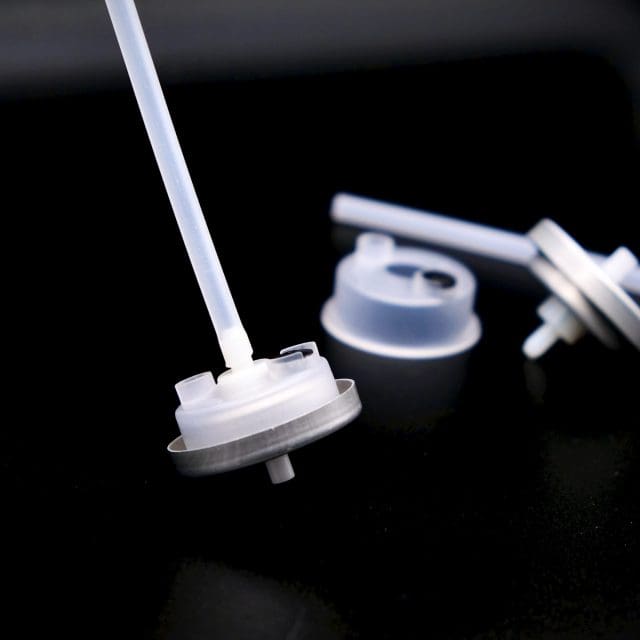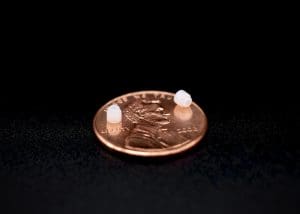
Tiny But Mighty
What is the size of the head of a pin and on the frontlines of fighting COVID-19?
At Mikrotech, we create custom micro components to solve our clients’ biggest challenges through every phase of the product development cycle. So when we got a call from a global, multi-billion-dollar company, maker of some of America’s most popular household and industrial products to help them solve a design roadblock, Mikrotech was up for the challenge.
Our client has a line of commercial cleaning and disinfectant products that are used in schools, office buildings, hospitals and the hospitality industry (i.e., restaurants and hotels). The company is continuously innovating new and improved portable dispensers that are more durable and make it easier to evenly distribute solutions on large surface areas such as sinks and toilets, shelves and countertops, desks and dining tables.
Our client had been developing a new type of cleaning bottle design that consisted of two canisters, one to hold water and the other to contain its concentrated cleaning solution. In the design concept, each trigger pull of the pump spray nozzle would draw and mix the exact amount of water with the exact amount of the solution and then disperse the mixture evenly on its aimed-for destination.
Too much water would dilute the solution and cause it to not work as effectively. Too much concentrated solution, would result in wasted cleaning supplies. Either scenario would also produce uneven cleaning results and not prevent germs from spreading–a hazard in any public place. And for a cleaning contractor working on slim margins, a high-functioning spray bottle can make all the difference between making a profit or not breaking even.
So what is the secret to a spray bottle that precisely mixes a perfectly measured solution?
It all boils down to a micro component called an “orifice restrictor.†This tiny piece is designed to allow a precise amount of concentrated solution to pass through the valve assembly via a diameter similar to the thickness of a human hair (approx. 0.004 inches, held to a tolerance of ± 0.0002 inches).
For two years, our client had engaged several high-profile conventional molders to manufacture this key component, to no avail. They simply couldn’t produce a part with features that small.
That’s where we come into the story.
The client called us and described their ongoing dilemma which had consumed two years of resources with existing suppliers. Our expert engineers took a look at the project and within two weeks were able to provide machined prototypes. It was the first time the client was able to conduct a successful proof of concept. Three months after proof of concept, we were able to provide samples off a prototype mold tool.
But the program seemed to hit another roadblock when many of our client’s suppliers took a pass on the actual assembly of the component due to its tiny size. So, working with our affiliate company, ASYST Automation, Mikrotech was able to revive the project once again. Automation was designed, manufactured, and programmed to provide our client’s sub-assemblies with the micro component.
As we parallel pathed the valve assembly automation and production mold tooling, we brought this program that was on the verge of cancellation, into production. And, in much less time than the two years our client spent spinning its wheels with other, much larger conventional molders.
Our client’s new and improved product, incorporating the orifice restrictor we were able to manufacture, hit the market as the COVID-19 pandemic continued to escalate across the globe. The need for professional cleaning companies and janitorial services — deemed essential businesses — has never been greater. While we now know much more about the COVID-19 virus and its transmission, the importance of cleaning and sanitizing has never been more critical, as indicated in the CDC guidelines.
We are proud of our micro component — tiny but mighty — on the frontlines of the battle with COVID-19.
This is just one example of the creativity and problem-solving expertise our micro-manufacturing team uses on a daily basis.

